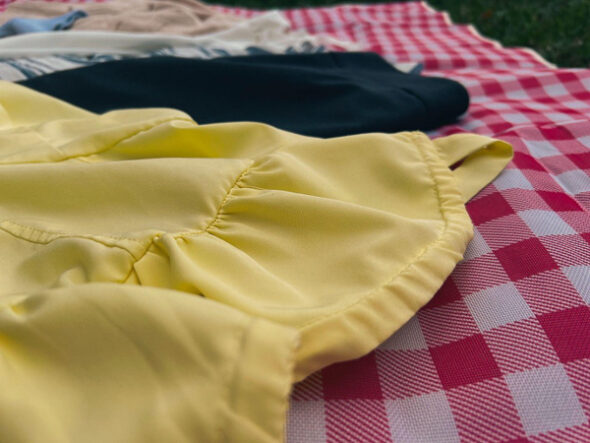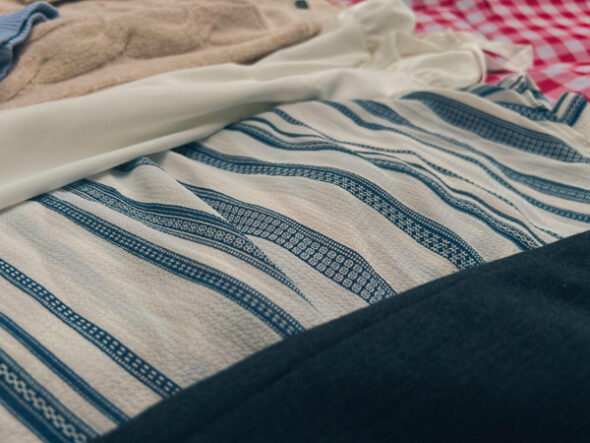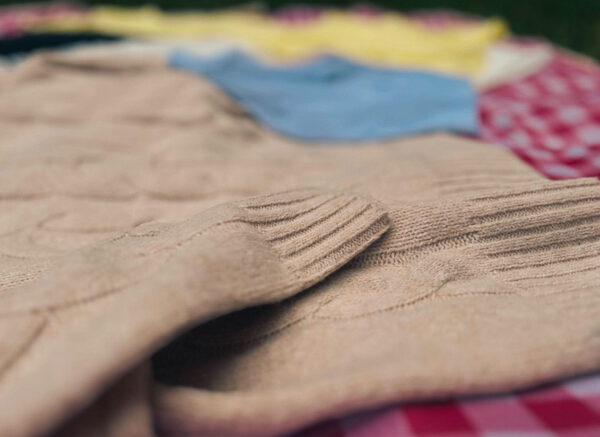By Nicole Rodriguez
FLAGLER COLLEGE- College students often don’t mind sharing their things with others, whether it’s extra snacks, old textbooks or clothing they don’t want anymore, many leave things outside of their dorm for others to take.
“I gave away a bunch of clothing last year, leaving it outside of the laundry room because it wasn’t my style, and wasn’t fitting me anymore,” Jeanne Tissot, a French sophomore at Flagler College said.
But now there is a new event on campus dedicated to allowing students to swap their unwanted clothing with each other and get free clothes without having to shop for them.
The Clothing Swap event held by the Down to Earth Club does this exactly and caters to budget-conscious Flagler students, promotes sustainability and eco-friendly practices and encourages community for a good cause.
This semester’s Clothing Swap was held on Feb. 20 and occurs once every semester, proving to be successful because of the large number of students that attend the event each semester.
“At one point, too many people brought too much clothing, so they needed people to just take clothes and not necessarily need to swap it for their own unwanted clothes,” Madison Torres, a Flagler junior who participates in the Clothing Swap said.
“The point of the Clothing Swap is to push the “reduce, reuse, recycle” mantra. We bring unwanted clothes that may otherwise be in landfills or thrift stores that already have way too much stock, and we try to share them with other college students so that it brings our community closer together, it helps out some people who might be in need, and it helps keep clothes out of the landfill,” the President September Boyer of the Down to Earth Club said.
Down to Earth Club focuses on the principles of Ecopsychology and formed a club that includes both psychology and non-psychology majors that involve students interested in getting outside, enjoying nature, and conserving the environment.
When Flagler sophomore Marissa Prusak was told about the Clothing Swap, she said that she found it useful to be able to look at clothes on the lawn to take them off of people’s hands, and that she would have gone if she had known about it before.

“I think the Clothing Swap is amazing to do because specifically at Flagler, people have a cool style and it’s so fun to try things and be able to share your style with someone because it’s such a small campus that you can find someone with your clothing,” Tissot said.
Students love the idea of a clothing swap even if they have never participated in one before.
“Although I didn’t hear about the Clothing Swap before, I love it and think it is very sustainable for our economy and good for the community because you can meet people with the same interests as you and talk about clothes, which is always a good conversation starter,” Emily Brutnell, a Flagler junior said.
The Clothing Swap is inspired by thrifting, an activity in which people go shopping at thrift stores or flea markets that sell used items at discounted prices. This has recently become a popular activity among the youth.
In fact, according to the United States Census Bureau (USCB), 62% of Gen Z and millennial consumers said they look for items secondhand before buying new.
Additionally, according to the Institute for Business Value and the National Retail Federation, 60% of Consumers Alter Habits for Environmental Impact. This shows the increase in awareness and change which has come so far.
When Tissot was asked if she goes to thrift shops, she explained that she hadn’t for the longest time. She thought that the clothing belonged to older people or would smell, but her friends suggested going and since then, she doesn’t buy any clothes by regular shopping.
“Thrifting is good for the environment, it’s a fun activity, and since trendy style changes, the younger generations are taking that old vintage style,” she said. “Thrifting in France is not as popular or as big and most of the time when you give clothing away, you give it to associations for little kids and families that need it. So I was positively surprised about U.S. thrifting.”
Many students noted and emphasized the benefits that thrifting and an event like a clothing swap have for the environment.
“I think thrifting is very good for the environment and sustainable to reuse clothing. It is unique and you might be lucky to find cool vintage clothing that has personality in it, plus it’s been increasing in popularity and they’re more common to come across now,” Brutnell said.
Brutnell’s statements were found to be supported by Business DIT and their findings because as of 2023, there are 28,849 thrift store businesses in the United States, a 3.5% increase from 2022.
“For the longest time, my parents couldn’t afford new clothing for me because they were expensive and it’s hard to get clothes every year when your kids are getting bigger each year. So my mom would take us to a children’s thrift clothing store. I used to be bullied for it, and now when I’m older, everybody thinks it’s a cool hip thing to thrift, which is interesting,” Torres said.
President September compared the Clothing Swap and thrifting and surprisingly said that she is not a fan of thrifting because most things in thrift stores now have become fast fashion-based. She explained that fast fashion refers to Shein and companies that mass-produce bad quality clothes and contribute to waste.
“I’m a fan of being sustainable and thrifting things, but I am not a fan of the idealized thrifting experience because a lot of people get the clothes cheap and resell them or thrift stores jack up the prices since there is such a big market for it. This takes away from the people who were benefited by thrift stores which are the disadvantaged communities,” Boyer said.
Fast fashion is often harmful to the environment and Torres shared her thoughts on this issue.
“Fast fashion is a waste of environmental resources. There’s no point. Some people struggle to get clothes and yet the fast fashion companies throw out clothing and don’t even give needy people a chance,” Torres said.
Shein is a shopping platform that has become popular in the past few years
“I get annoyed whenever I see Shein or fast fashion clothing because it is already so cheap and so the price is marked down even more or upsold, even when it wasn’t expensive to make in the first place and made in the wrong way,” Brutnell said
Interestingly enough, the fast fashion industry is responsible for as much as 10% of global carbon dioxide emissions, therefore, it is a significant contributor to the climate crisis according to the Center for Biological Diversity.
Thrifting allows younger generations to find quality yet affordable items. The Clothing Swap provides students with quality and vintage clothing from others of the same age, all completely free to take without any possible upselling of a thrift store.

“Buying new clothes that are so expensive nowadays is just not worth it when you can easily go to a thrift store and find the same thing for a better price. And then thrifting is nice, but getting clothes from something like the Clothing Swap makes the clothes more valuable and meaningful since it’s so unique and free from other Flagler students,” Prusak said.
The Down to Earth Club supports eco-friendly lifestyles and students hope that they continue to host events like this one.
“I always support the Clothing Swap and I hope that the Down to Earth Club continues with that because there are some people who don’t understand the concept; the concept that our Earth is dying and that the little steps matter to make sure that we go on the right path,” Torres



Be the first to comment on "Flagler students spill: Clothing swap, thrift or fast fashion?"